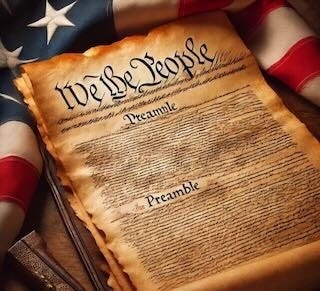
Securing the Future: The Vital Role of Election Integrity in Our Constitutional Republic
Author: Danielle Cassase, Co-founder and Director, Project CIVICA
The reliability and integrity of elections have been a concern for many Americans, especially following the 2020 election. However, election disputes are not new. Controversies date back decades, including the 2000 Bush-Gore race, allegations of unfair practices in the 2016 Democratic primaries, and accusations from both parties in the 2016 general election. The 2020 election heightened concerns due to procedural changes during the COVID-19 pandemic, the widespread use of mail-in ballots, and questions about transparency in key swing states (National Conference of State Legislatures, 2021).
During the pandemic, many grassroots researchers and activists scrutinized election procedures, government documents, and media narratives. Their findings led to increased skepticism about the integrity of the electoral system and frustration over perceived barriers to accountability. These concerns highlight a critical issue: if the election process lacks transparency and trust, the foundation of representative government is at risk.
Thanks for reading! Subscribe for free to receive new posts and support my work.

Regardless of political affiliation, confidence in the electoral process is essential for democracy to function effectively. Ensuring that elections are conducted lawfully and fairly should be a shared goal for all citizens. Civic engagement, including voter participation, election oversight, and advocacy for election integrity, is a fundamental duty of an informed electorate.
The U.S. Constitution and the Republic
The United States is a constitutional republic, a system where elected representatives make decisions on behalf of the people while adhering to a written Constitution. This foundational document establishes the government's structure, limits its powers, and protects individual rights (National Archives).
Key Features of a Constitutional Republic:
• Elected Representation: Citizens elect leaders who create and enforce laws while remaining accountable to the people.
• Written Constitution: The Constitution serves as the highest legal authority, guiding governance and ensuring consistency in the rule of law.
• Protection of Individual Rights: The Bill of Rights guarantees fundamental freedoms, including speech, religion, and due process (Library of Congress).
Two of the most critical documents in American history are the Declaration of Independence (1776) and the U.S. Constitution (1787). The Declaration outlines the nation’s founding principles, emphasizing that government derives its power from the consent of the governed. The Constitution provides the practical framework for governance, defining the separation of powers and the relationship between federal and state governments.

The United States was founded in 1776 in response to injustices imposed by Great Britain. The Declaration of Independence asserted that individuals are inherently entitled to "life, liberty, and the pursuit of happiness." It emphasized that government exists to protect these natural rights and affirmed the people's right to alter or abolish any government that systematically violates them. While the Constitution details how the government functions, the Declaration defines the principles that make a government just.
Both documents are essential reading for any engaged citizen. Readers can access the full versions of these documents at the following links:
- Declaration of Independence
- U.S. Constitution
- Bill of Rights
- New York State Constitution (1777)
- Current New York State Constitution (2025)
The Role of Citizens in a Republic
The Founding Fathers designed the U.S. Constitution to ensure that the government remains accountable to the people. Article V of the Constitution provides a mechanism for amending the document, allowing necessary changes through a rigorous process requiring both congressional approval and state ratification (National Constitution Center).
The success of a constitutional republic depends on active and informed citizen participation. Civic engagement can take many forms, including:
- Voting: Participating in elections at all levels ensures representation aligns with the will of the people.
- Election Oversight: Observing elections and advocating for transparent processes helps ensure voting integrity.
- Education: Understanding the Constitution and the rights it guarantees empowers citizens to hold leaders accountable.
- Community Involvement: Engaging in local governance, attending town hall meetings, and communicating with representatives are crucial for shaping policies that affect daily life.
In a constitutional republic, government derives its legitimacy from the people. However, that legitimacy is only as strong as the trust citizens have in the electoral process and the rule of law. By staying informed, actively participating, and demanding transparency, Americans can safeguard the integrity of their democracy for generations to come. The Constitution provides the framework, but it is the people who bring it to life.
So, what does true engagement and ownership look like? It starts with you. Embrace the responsibility that comes with being an American. Get involved in local governance and community affairs—attend town meetings to stay informed, serve on advisory boards or political committees to share your voice, and consider running for local office or supporting candidates who champion freedom and meaningful policy change. Beyond elections, support nonprofits that nurture ongoing civic participation and strengthen community ties. Take the next step and join Project Civica to discover how we can work together to shape the future of New York and uphold the values of our great republic.
This overview is the first in a series of articles that will delve into the topics discussed in greater detail.
References
- Library of Congress. (2021). Bill of Rights. Retrieved from https://www.loc.gov/
- National Archives. (2021). The Constitution of the United States. Retrieved from https://www.archives.gov/
- National Conference of State Legislatures. (2021). Election security and integrity. Retrieved from https://www.ncsl.org/
- National Constitution Center. (2021). Article V and the amendment process. Retrieved from https://constitutioncenter.org/
Recent Stories
-
Headline USAEXCLUSIVE: Election-Integrity Watchdog Sees Real Possibility of New York Flipping Red
-
SubStack.com | Project CivicaSecuring the Future: The Vital Role of Election Integrity in Our Constitutional Republic
-
SubStack | Project CivicaGermany’s Election Blueprint: A Trust-Building Model For America
-
Substack.com | Project CivicaThe Power of Participation
-
Substack.com | Project CivicaOrdo Amoris: Have we inverted civic responsibility?
-
SubStack.com | Project CivicaRanked Choice Voting: Modern Innovation or Another Bureaucratic Shell Game?
-
SubStack | Project CivicaRanked Choice Voting: A Trojan Horse for One-Party Rule?
-
SubStack | Project CivicaVoting with Your Feet: The Great Exodus Out of New York
-
SubStack | Project CivicaThe $254.3 Billion Secret: Behind Closed Doors - Without You.
-
SubStack | Project CivicaNew York’s Curious “New Year’s Baby Boom”: What’s Really Behind the January 1 Birthdate Spike in the Voter Rolls?
-
SubStack | Project CivicaUpdated with Embedded Video: January 1: Born to Vote**
-
SubStack | Project Civica🚨 New York is at a crossroads.

